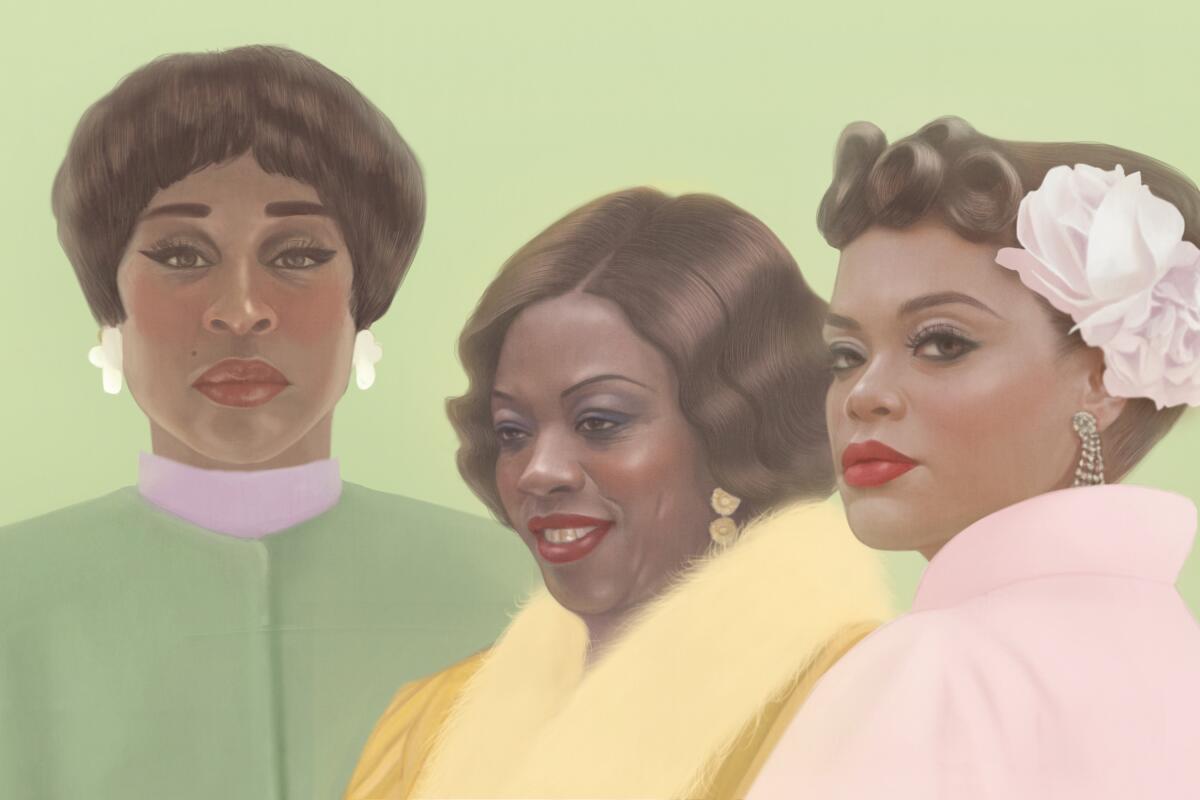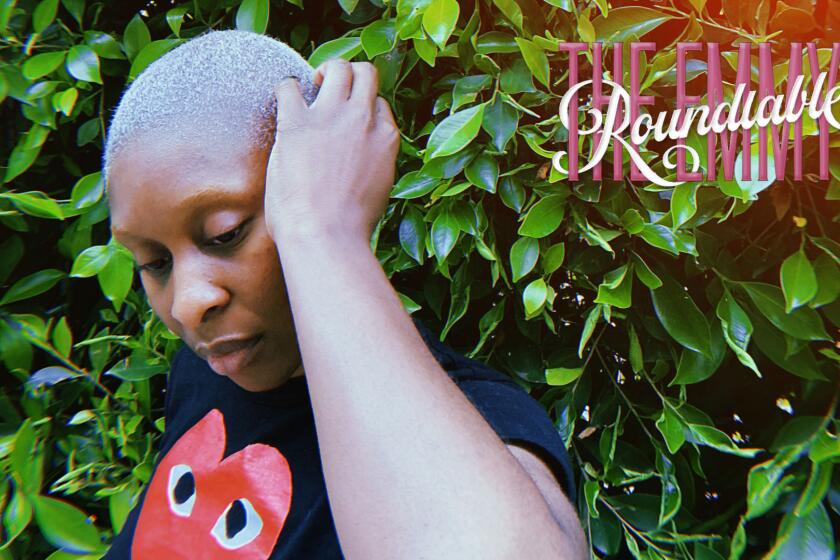Three actresses, three powerful roles as real-life singers

- Share via
Black actresses give voice this winter to three gifted singers who raised a soul-stirring hue and cry destined to resound through the ages. Ma Rainey, Billie Holiday and Aretha Franklin come to life this winter via transformative performances by Viola Davis, Andra Day and Cynthia Erivo respectively. The actresses inhabit the lives of musical artists who insisted on making themselves heard in the face of personal and political struggles that might have muted lesser talents.
Here’s a look at how each actress brought her role model to life in film.
‘Ma Rainey’s Black Bottom’
Adapted from Pulitzer Prize winner August Wilson’s stage play, this Netflix movie tracks a fractious 1929 Chicago recording session during which LGBTQ blues singer Rainey tangles with her Black sidemen and the white businessmen attempting to rein her in.
The voice: Maxayn Lewis, a former singer in the Ike and Tina Turner Revue, recorded the Ma Rainey tracks in New Orleans under Branford Marsalis’ supervision. Two-time Oscar nominee Viola Davis then used Lewis’ vocals as a reference for her own performance.
The body language: Davis gained weight, getting up to nearly 200 pounds before donning a “fat suit” to approximate her 300-pound role model. Sweaty in the Chicago heat, she carries herself with a world-weary gait until the music begins. Then the exhaustion evaporates, and Davis as Rainey lightens up as a hip-swaying blues-shouter.
The hair: For her live shows, Davis wore a finger-waved wig made from horsehair in homage to the blues singer’s real-life stage hair.
The outfits: Sash, stole, shawl, bling, necklace, brocaded scoop-neck dress — and gold teeth.
The nemesis: Headstrong trumpet player (the late Chadwick Boseman), manipulative white manager and pushy white record producer in particular; racist music industry in general.
Key tunes: The bawdy title track and “Moaning Blues,” which opens the film with Rainey growling, “Daddy, daddy, please come home to me.”
The quotables: (to her manager) “We’ll be ready to go when Momma says we’re ready to go. That’s the way it go around here.”
‘The United States vs. Billie Holiday’
This biopic on Hulu, based on a chapter in Johann Hari’s 2015 book, “Chasing the Scream: The First and Last Days of the War on Drugs,” features Grammy-nominated singer Andra Day as the jazz singer.
The voice: Day does her own singing, modifying her regular singing voice to emulate Holiday’s tremulous vibrato.
The body language: A languid presence on stage, Day as Holiday relies almost entirely on her eyes and her voice to communicate with audiences.
The hair: Director Lee Daniels envisioned six separate looks for Day, including the familiar gardenia she wore with her straightened hair for live performances. Offstage, bobbed in a blunt cut.
The outfits: Elbow-length white gloves, pearls, fit-and-flared dresses.
The nemesis: Heroin and the FBI. The feds’ narcotics chief (Garrett Hedlund) targets Holiday’s drug addiction to keep her from singing out against Jim Crow violence.
Key tune: “Strange Fruit.” Written by a Brooklyn schoolteacher, the now-classic protest song laments lynching with its haunting lyrics: “Black bodies swingin’ in the Southern breeze/Strange fruit hangin’ from the poplar trees.”
The quotable: (to her producer) “I can sing what the f— I want.”
‘Genius: Aretha’
Ahead of Jennifer Hudson’s “Respect” biopic set for August release, British actress Cynthia Erivo steps in on television to play Aretha Franklin in this NatGeo series launching later this month from Pulitzer Prize-winning playwright Suzan-Lori Parks (who also cowrote “Billie Holiday.”) “Genius” shines a light on Franklin’s prodigious musicianship as a source of inspiration for ‘60s-era activists of all stripes.
The voice: Erivo does her own singing. Before earning an Oscar nomination as Harriet Tubman in “Harriet,” Erivo won a Tony for her vocal tour de force in “The Color Purple.” For “Genius,” Erivo teamed with Grammy Award-winning producer Raphael Saadiq to re-create classic Franklin tracks from scratch.
The body language: Erivo’s posture and gestures exemplify a woman of supreme confidence.
The hair: Straightened hair gives way to a natural Afro, symbolizing Franklin’s embrace of Black empowerment.
The outfits: The singer’s chic turtlenecks and glittering floor-length gowns are based on archival imagery and replicated by costume designer Jennifer Bryan.
The nemesis: Relationships and racism. A mother of two by age 14, Franklin had complicated relationships with domineering father C.L. Franklin (Courtney B. Vance) and controlling husband-manager Ted White (Malcolm Barrett). She later joined the civil rights movement to combat racism.
Key tune: “Ain’t No Way.” Erivo landed the role after her rendition of Franklin’s 1968 soul ballad made its way to veteran music mogul Clive Davis, a “Genius” executive producer.
The quotable: “My singing voice has always been my guardian angel. Keeps me safe.”
More to Read
Sign up for The Envelope
Get exclusive awards season news, in-depth interviews and columnist Glenn Whipp’s must-read analysis straight to your inbox.
You may occasionally receive promotional content from the Los Angeles Times.









